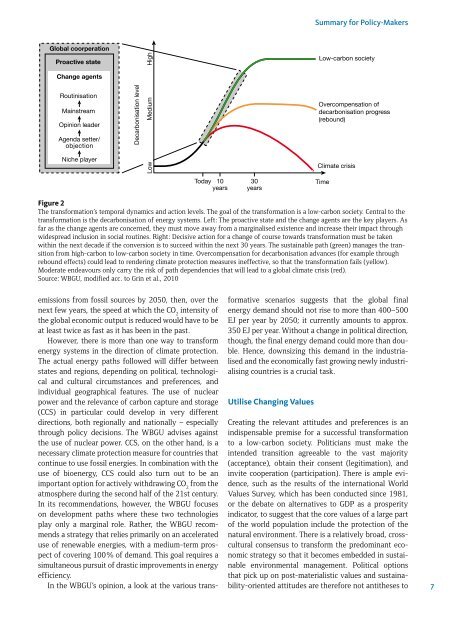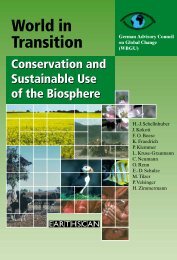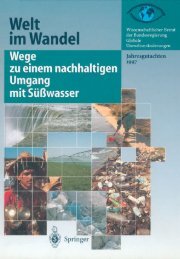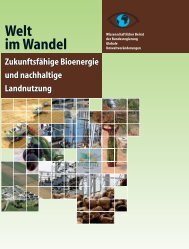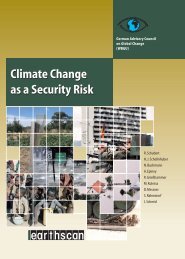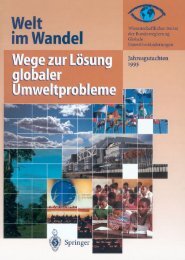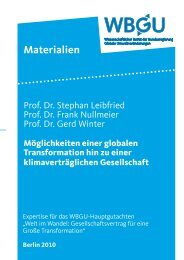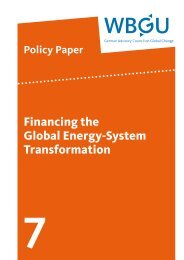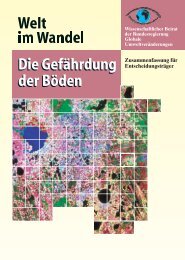World in Transition: A Social Contract for Sustainability - WBGU
World in Transition: A Social Contract for Sustainability - WBGU
World in Transition: A Social Contract for Sustainability - WBGU
Create successful ePaper yourself
Turn your PDF publications into a flip-book with our unique Google optimized e-Paper software.
Global coorperation<br />
Proactive state<br />
Change agents<br />
Rout<strong>in</strong>isation<br />
Ma<strong>in</strong>stream<br />
Op<strong>in</strong>ion leader<br />
Agenda setter/<br />
objection<br />
Niche player<br />
emissions from fossil sources by 2050, then, over the<br />
next few years, the speed at which the CO 2 <strong>in</strong>tensity of<br />
the global economic output is reduced would have to be<br />
at least twice as fast as it has been <strong>in</strong> the past.<br />
However, there is more than one way to trans<strong>for</strong>m<br />
energy systems <strong>in</strong> the direction of climate protection.<br />
The actual energy paths followed will differ between<br />
states and regions, depend<strong>in</strong>g on political, technological<br />
and cultural circumstances and preferences, and<br />
<strong>in</strong>dividual geographical features. The use of nuclear<br />
power and the relevance of carbon capture and storage<br />
(CCS) <strong>in</strong> particular could develop <strong>in</strong> very different<br />
directions, both regionally and nationally – especially<br />
through policy decisions. The <strong>WBGU</strong> advises aga<strong>in</strong>st<br />
the use of nuclear power. CCS, on the other hand, is a<br />
necessary climate protection measure <strong>for</strong> countries that<br />
cont<strong>in</strong>ue to use fossil energies. In comb<strong>in</strong>ation with the<br />
use of bioenergy, CCS could also turn out to be an<br />
important option <strong>for</strong> actively withdraw<strong>in</strong>g CO 2 from the<br />
atmosphere dur<strong>in</strong>g the second half of the 21st century.<br />
In its recommendations, however, the <strong>WBGU</strong> focuses<br />
on development paths where these two technologies<br />
play only a marg<strong>in</strong>al role. Rather, the <strong>WBGU</strong> recommends<br />
a strategy that relies primarily on an accelerated<br />
use of renewable energies, with a medium-term prospect<br />
of cover<strong>in</strong>g 100 % of demand. This goal requires a<br />
simultaneous pursuit of drastic improvements <strong>in</strong> energy<br />
efficiency.<br />
In the <strong>WBGU</strong>’s op<strong>in</strong>ion, a look at the various trans-<br />
Decarbonisation level<br />
Low Medium High<br />
Today 10 30<br />
Time<br />
years years<br />
Summary <strong>for</strong> Policy-Makers<br />
<strong>for</strong>mative scenarios suggests that the global f<strong>in</strong>al<br />
energy demand should not rise to more than 400–500<br />
EJ per year by 2050; it currently amounts to approx.<br />
350 EJ per year. Without a change <strong>in</strong> political direction,<br />
though, the f<strong>in</strong>al energy demand could more than double.<br />
Hence, downsiz<strong>in</strong>g this demand <strong>in</strong> the <strong>in</strong>dustrialised<br />
and the economically fast grow<strong>in</strong>g newly <strong>in</strong>dustrialis<strong>in</strong>g<br />
countries is a crucial task.<br />
Utilise Chang<strong>in</strong>g Values<br />
Low-carbon society<br />
Overcompensation of<br />
decarbonisation progress<br />
(rebound)<br />
Climate crisis<br />
Figure 2<br />
The trans<strong>for</strong>mation’s temporal dynamics and action levels. The goal of the trans<strong>for</strong>mation is a low-carbon society. Central to the<br />
trans<strong>for</strong>mation is the decarbonisation of energy systems. Left: The proactive state and the change agents are the key players. As<br />
far as the change agents are concerned, they must move away from a marg<strong>in</strong>alised existence and <strong>in</strong>crease their impact through<br />
widespread <strong>in</strong>clusion <strong>in</strong> social rout<strong>in</strong>es. Right: Decisive action <strong>for</strong> a change of course towards trans<strong>for</strong>mation must be taken<br />
with<strong>in</strong> the next decade if the conversion is to succeed with<strong>in</strong> the next 30 years. The susta<strong>in</strong>able path (green) manages the transition<br />
from high-carbon to low-carbon society <strong>in</strong> time. Overcompensation <strong>for</strong> decarbonisation advances (<strong>for</strong> example through<br />
rebound effects) could lead to render<strong>in</strong>g climate protection measures <strong>in</strong>effective, so that the trans<strong>for</strong>mation fails (yellow).<br />
Moderate endeavours only carry the risk of path dependencies that will lead to a global climate crisis (red).<br />
Source: <strong>WBGU</strong>, modified acc. to Gr<strong>in</strong> et al., 2010<br />
Creat<strong>in</strong>g the relevant attitudes and preferences is an<br />
<strong>in</strong>dispensable premise <strong>for</strong> a successful trans<strong>for</strong>mation<br />
to a low-carbon society. Politicians must make the<br />
<strong>in</strong>tended transition agreeable to the vast majority<br />
(acceptance), obta<strong>in</strong> their consent (legitimation), and<br />
<strong>in</strong>vite cooperation (participation). There is ample evidence,<br />
such as the results of the <strong>in</strong>ternational <strong>World</strong><br />
Values Survey, which has been conducted s<strong>in</strong>ce 1981,<br />
or the debate on alternatives to GDP as a prosperity<br />
<strong>in</strong>dicator, to suggest that the core values of a large part<br />
of the world population <strong>in</strong>clude the protection of the<br />
natural environment. There is a relatively broad, crosscultural<br />
consensus to trans<strong>for</strong>m the predom<strong>in</strong>ant economic<br />
strategy so that it becomes embedded <strong>in</strong> susta<strong>in</strong>able<br />
environmental management. Political options<br />
that pick up on post-materialistic values and susta<strong>in</strong>ability-oriented<br />
attitudes are there<strong>for</strong>e not antitheses to<br />
7


